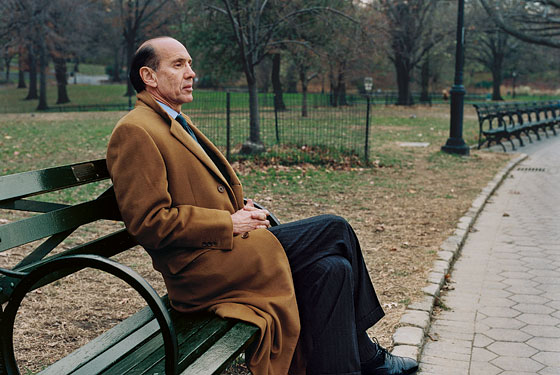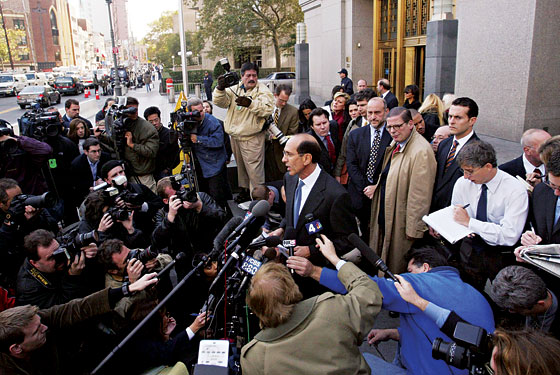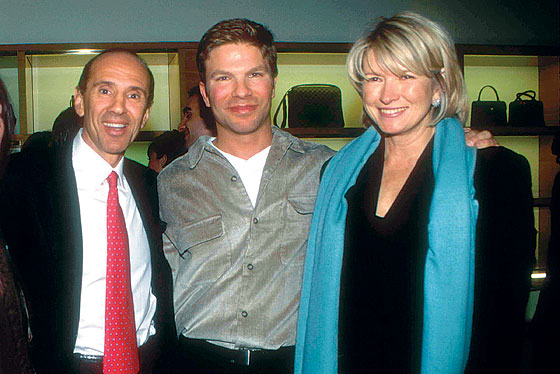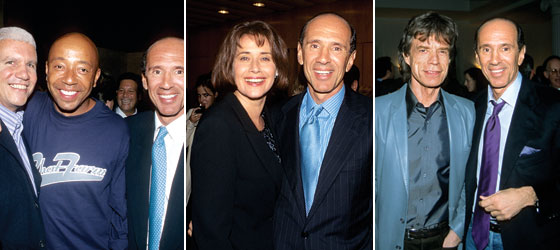
A few months before he got out of jail, Sam Waksal sent word that he needed a new place to live, and his daughter Elana set about finding a home that would measure up to what the immunologist, biotech entrepreneur, intellectual, sophisticate, friend of Martha Stewart, former “Page Six” regular, and federally convicted inside-trader calls “my aesthetic.”
Waksal had been set back a bit by prison, but never entirely brought low. During what he euphemistically waves off as “my time away,” many of his belongings lay in storage: his Jean-Michel Frank furniture from the forties; much of his art, including a Rothko, some works by Cy Twombly, and a world-class collection of rare Etruscan pottery, some of which he found himself on faraway digs; and his beloved books—“old volumes, as old as I can get them,” like an eighteenth-century French translation of Descartes’s Principles of Philosophy. And last summer, upon his conditional release from a halfway house in the Bronx, Waksal had everything moved into a peaceful apartment his family had found for him—not in Soho, where he’d famously lived, worked, and thrown fabulous parties, but on the Upper East Side.
“I decided it was actually hipper than Soho—especially since I’m living here now,” Waksal says. He means it as a joke. “When I came back, Soho was sort of, you know, like a shopping mall. Being in exile, one of the things that was terrible was the brutality of the aesthetic. It’s brutal. And where I am right now, it is not.”
Waksal is sitting at the far back table of a small, warmly lit café in his new neighborhood. A young-looking 61, he speaks in a warm, soft twang. He has always been stylish for a scientist—slender and elegant in dark bespoke suits with monogrammed French-cuff shirts (“None of this is brand,” he says. “It’s made”)—with a taste for fine art and attractive women and exclusive parties. But he is also well-read and ostentatiously intellectual. As he sips an espresso, he starts name-checking Continental philosophers—Sartre, Kant, Spinoza, Wittgenstein— assuming I’ll keep up, as he talks about prison: the “ineffable sadness” of the place, and how he transcended the monotony by reading (or, in many cases, rereading) almost the entire Western canon, including two different accounts of the Peloponnesian Wars. He also passed the time by writing two novels, a memoir, and some poetry, and teaching courses to his fellow inmates with titles like Science in the 21st Century and The History of the Western Idea, and—most popular, by far—Philosophy and Business. “They always wanted to know, ‘How did you use this information to be successful?’ ” he says, laughing. “I wanted to say to them, ‘I’m in prison, guys, I’m not successful.’ ”
And yet he is now. Despite his conviction and five years in prison, Sam Waksal has emerged, at least in business terms, a success. Last November, just three months after his release, ImClone, the biotech company he famously founded in Soho 25 years ago, was sold to the pharmaceutical giant Eli Lilly for $6.5 billion. At the center of the sale was a now-successful cancer drug called Erbitux, the same drug whose approval problems with the FDA in 2001 had led to Waksal’s insider-trading conviction. At the end of that year, facing unexpected hurdles in the Erbitux FDA-approval process, Waksal oversaw the dumping of some 79,000 shares of ImClone in a series of suspiciously timed trades that would go on to bring him down and also lead to Martha Stewart’s obstruction-of-justice conviction. Waksal is no longer with ImClone—he resigned in disgrace, and he is forbidden for now by the court to head any public company. But he still had ImClone options at the time of the sale, and so he likely made a fortune off the Eli Lilly deal (he won’t say how much, though he will say “the world doesn’t have to worry about me”). That he would have made more and avoided five years in prison if he’d only been more patient, or really believed in his own drug, or both, does not need to be remarked upon. Erbitux, which last year generated more than $1.5 billion in sales, has prolonged the lives of thousands of cancer patients, and the drug’s approach is widely understood to be a model for the next generation of cancer treatments.
Although Waksal has been humbled somewhat, he is by no means a changed man. Even now, he struggles to explain exactly why he did what he did. He is determined to return to the biotech world and is actively seeking investors for another start-up. Perhaps most importantly, he feels vindicated by the success of Erbitux. Waksal is starting his second act determined to behave as if nothing ever went wrong in the first. “The moving finger writes,” he says—he’s quoting the eleventh-century Persian mathematician-astronomer-poet Omar Khayyam—“and having writ, moves on.”

The night before he went to prison, Sam Waksal threw one last party. His rise and fall had been impressive even by New York rise-and-fall standards. In cancer labs and boardrooms, in academia and society, he had been known for years as New York’s biotech king—the striving, brilliant son of Holocaust survivors who spoke six languages, developed possible cures for fatal diseases, hosted high-minded intellectual salons and legendary parties, collected $20 million worth of art, and squired women half his age. In 2001, he had used the early promise of Erbitux to orchestrate a $2 billion deal with Bristol-Myers Squibb—the biggest biotech deal of its time, personally netting him more than $50 million. Then came the insider-trading charges. Waksal was indicted in 2002 and sentenced in 2003. ImClone was in crisis; Erbitux was considered snake oil.
Waksal had told his friend Tina Brown that he was looking forward to the solitude of jail—that it was going to be, for him, a “forced monastic event.” But that night at his loft on Thompson Street, he was anything but a monk, handing out $600 magnums of Château Lafitte Rothschild from the cellar. About 40 people showed up; at one point, he announced that Martha Stewart had called to send her good wishes (she wouldn’t go to jail for another year). Lorraine Bracco reportedly told him she’d heard that inmates could call their girlfriends for phone sex, and Waksal turned it into a flirty line to some of the women there: “If I call you, can we have phone sex?”
The next day, July 23, 2003, Waksal arrived at Schuylkill, the federal prison in Pennsylvania, a three-hour drive from Soho. His brother, Harlan, was with him, as was one of his closest friends, the Harvard geneticist Richard Mulligan, who had once served on ImClone’s advisory board. The three men started walking from the car, but a guard stopped them and said Waksal would have to walk alone from there. Only then, Waksal says, did it become real. “It was like when I jumped out of an airplane the first time, and I said to the guy, ‘I’m afraid of heights, I’m not going,’ and the guy said, ‘I can’t hear you,’ grabbed me, and pushed me out. I walked in, and that was that. I was in prison.”
Waksal’s lawyer had campaigned for his client to serve his time at Eglin Air Force Base in Florida, the jail best known as Club Fed. It didn’t work. Instead, he went to Schuylkill for 19 months, then a federal prison upstate, in Otisville, for 23 months, and a final 17 months at a prison in Milan, Michigan. He worried for his safety, but not for long. Only Milan had fences with razor wire, and Otisville struck Waksal as less of a prison than “a bad sleepaway camp in the Catskills.” He played basketball and softball at one prison, tennis at another. One of his bunkmates was a synagogue director who had robbed his own congregation. “When he got sentenced, every congregant came and said, ‘Put him away forever!’ ” he says. “He was this sweet old guy.”
Waksal was given menial work, like carrying cleaning products in and out of the living quarters, but that only took a few minutes a day. Evenings were spent in the barracks. The rest of his time, from when he woke up until 4 p.m. roll call, was unscheduled. Finding something to do to fill the hours became daunting. Waksal saw how some people worked in the kitchen so they could horde food, or took a job in the prison warehouse so they could work with numbers, or devoted themselves to the black-market trade of cigarettes. He says he tried to devote himself to a life of the mind. He was immediately reminded of what Machiavelli endured when he was exiled from Florence to a tiny village in Northern Italy. “Machiavelli was upset about the same things that anybody would be upset about. The boredom, the unbelievable boredom of it all. The noise. And the stupidity of what people do all day.” There were unexpected lighter moments: Waksal remembers hearing one guy think the word aplomb was “a plum,” and being surprised to hear himself laugh. But mostly, it was chaos. “Everyone’s playing cards every night. Everybody. They’re playing gin, they’re playing spades, they’re playing bridge. It’s a great way to pass time, and they do it for hours—five o’clock on, you know, as much as they can. They’re playing cards all night. Poker for, you know, cans of tuna. And you watch and they’re screaming. The noise in prison is unbelievable.”
He had a steady schedule of visitors. Both his daughters, Elana and Aliza, came often, as did Alexis Stewart, Martha’s daughter, whom he dated for nearly four years and with whom he has remained close. His parents came, too—each survivors of the Holocaust, now visiting their firstborn behind bars. At best, seeing them was a mixed blessing. “I mean, what am I gonna say to my mom—‘The food’s really terrible’? To someone who was eating peels out of a garbage can to survive?” He’d sit with his visitors outside at plastic tables with umbrellas or in a desolate room that looked like the waiting area of an airport. “He always looked perfect in jail. His hair, everything,” says his friend the novelist André Aciman. Sometimes he’d grouse about his sentence. “He thought it was way over the top for what it was. He felt the judge took aim at him.”

Did he dwell on the events that brought him there?
“I relived moments I wish hadn’t occurred,” Waksal says. “The what-ifs. But that can make you nuts, right?”
On one of his visits to prison, another friend remembers confronting Waksal on the subject. “You’re extraordinary in so many ways,” he said. “Why do you find the need to go over that line?”
How did Waksal respond? The friend shakes his head. “It’s like I didn’t say it.”
Waksal saw many inmates holding out hope for an early release, working closely with lawyers on appeals. He joined them, staging a new campaign every few months for the court’s mercy. Early on, he was convinced he’d be out any month now—for his daughter’s wedding, or to care for his parents, or because of his great contribution to society. “He really believed it would work,” says Myer Berlow, another old friend. “Every fiber of my being wanted to say ‘Stop with this! You’re much too intelligent to think you’re gonna get out!’ But I played along. It’s something people need to do.”
“Walter Benjamin said it—‘Hope is for the hopeless,’ ” Waksal says. “And everyone in prison has hope. That helps you get through it, crazily enough. It’s a great psychological tool. To fool yourself. It’s great. It’s delusional. It’s like a drug.”
Waksal wrote prolifically, almost as therapy. First came a memoir-style account of the ImClone story (started out of anger, Waksal says), then a prison memoir, then a first-person novella called Silence, “about someone who doesn’t speak and lives with himself for a long period of time. It’s kind of cool. Because there was a chunk of time I just didn’t talk to anybody.” Then he wrote a novel called To Predict the Future, which alternates between the present day and Germany between the wars. “Weimar Germany was interesting because it was everything,” he says excitedly. “You had Brecht, and Weill, and Benjamin, and Gershom Scholem started there. You had all the Hungarian physicists, from Edward Teller to Leo Szilard to Eugene Wigner, all the ones from Budapest had gone there and were studying in Berlin. Everybody. You had writers and most of them were Jews, and most of them did not see what was going to happen.”
He also read. “I reread all the Greeks,” he says, smiling. “All. I read everything. Euripides, and Sophocles, and every other Greek that had ever written. You just have to read Aristotle’s Poetics, and you read what tragedy is—and you look at yourself and think, ‘Shit, man, this is tragic.’ ”
On a Friday night just before five, Waksal is at a table in the lobby bar of the Carlyle with Richard Mulligan, the former ImClone advisory-board member and friend who had brought him to jail. “Richard is one of the people who discovered the entire field of gene therapy,” Waksal says. “Neither one of us likes to hang out with dumb people.”
Mulligan is drinking a martini. Waksal is sipping tea. Waksal shaved nine months off of his sentence by participating in a prison-related rehab program, even though he apparently never showed any signs of dependency before going to jail. (Rehab is said to be a popular way for white-collar offenders to reduce their jail time.) Since getting out, Waksal has been meeting with Mulligan at least once a week, talking about all the same things they used to talk about before the bad times—“scientific things, business things, and women,” says Mulligan, “not necessarily in that order.”
Waksal is more circumspect about his personal life than he used to be, and he’s certainly leading a quieter life than he did before prison. Some of his more famous old friends seem to be keeping their distance now: Martha Stewart, among others, would not be interviewed for this story, instead issuing a quote wishing him “new successes.” (“I think that Martha and I never had a moment that wasn’t a positive one,” Waksal says. “I’ll leave it at that, because there’s no need to say more. She’s an old and dear friend.”) He insists that he never thought of himself as a boldface name to begin with—that his work and cultural pursuits were always more important to him. “I mean, yes, there were absolutely famous friends. I was part of New York! This is a world that juxtaposes rich and poor, intellectual and barbarians at the gate—everything, right?” He blames the media for focusing on the more salacious aspects of his life: “They’d rather write that there were a bunch of tall blondes in my apartment during a Christmas party!”
Why were those women there?
Waksal smiles. “You know, you’re not going to have a party with just scientists. And most of the CEOs in the world are boring morons.”

He says he spends much of his time planning his next career move. “I came back to engage a life. Sartre said that life begins on the other side of despair.” In the past few months, he and Mulligan have quietly taken meetings with investors about a new plan for a business that they say will use the ImClone model to bridge the gap between the worlds of academia, biotechnology, and big pharma. Waksal insists his insider-trading conviction isn’t hindering his business plans. “There’s no scientist out there that has been wary of me,” he says. “And guys in the venture-capital world I dealt with before—it’s as if I wasn’t gone a day!”
The one subject that doesn’t come naturally to Waksal is what he actually did wrong. I bring it up when he mentions reading Aristotle. What, I ask, was your tragic flaw? “I only tell my shrink that,” he says. Then he reconsiders and begins groping for answers.
He starts by chalking up his crime to a momentary, isolated, and inexplicable lapse of judgment. “You’re asking me to tell you why I did what I did, and I wish I could give you a good answer—because in retrospect, I can’t believe that I would do something so unbelievably stupid. It wasn’t like I committed accounting fraud at the company. I made a really stupid phone call that I was ashamed of.”
He’s even willing to allow a moral component. “I did something that was just stupid. And wrong. Stupid and wrong is a bad combination.” And yet he still seems to be searching for a loophole. The government says that Waksal knew that the FDA was about to delay the approval of Erbitux and that Waksal arranged for his father and younger daughter, Aliza, to dump their shares based on that information. But Waksal insists that he hadn’t heard about the FDA’s plans yet—that he only had an inkling that a delay was coming. He concedes that he was wrong, as CEO, to act on that hunch and tip off his family. But he suggests that having a hunch and not the hard facts at least partially absolves him. “For a while, I was trying to tell myself, ‘Well, I didn’t have the insider information, so it was okay,’ ” he says. “It wasn’t okay. I might have heard rumors, but they were filtered through my brain, which is different from the brain of shareholders. As CEO, I knew everything that was going on. Had I thought for three seconds, ‘If everyone knew I was doing this, would I be embarrassed about it?’ I would have said, ‘Forget it, it’s illegal.’ I wouldn’t have done it.”
Finally he circles back to the I-can’t-explain-it defense: “But I don’t know what was going on in my head at that moment.”
“You just have to read Aristotle’s ‘Poetics,’ and you read what tragedy is—and you look at yourself and think, ‘Man, this is tragic.’ ”
There are, of course, less-charitable explanations for why he did what he did. Some people believe he’s nothing more than a born con man. “Cutting corners for Sam was like substance abuse,” a former colleague of Waksal’s once said. “He did it in every aspect of his life, throughout his entire life.” Before he started ImClone, in the seventies and early eighties, he cycled through research positions at nearly a half-dozen institutions, including NIH’s National Cancer Institute—nearly every job ending under questionable circumstances. Sometimes he was accused of fudging his credentials, other times cutting corners or falsifying research. “Why would someone so brilliant lie?” asked Len Herzenberg, who ran a lab at Stanford, in one report. Waksal has always denied any wrongdoing, but he admits to a degree of looseness in his work. “I was really good when I did science, but I was sometimes a bit flighty,” he says.
Some people say Waksal has sought to take too much credit for Erbitux. While it’s true that he was the first to see the drug’s full potential and develop it commercially, the compound had been discovered years earlier by a team led by John Mendelsohn, a researcher then at UC San Diego, who has since accused Waksal of embellishing his role. Others believe that Waksal is simply so ambitious that he’d do anything to succeed. They even think it’s possible that his Holocaust legacy played a role. “I know your motives aren’t as important as your actions,” says Myer Berlow. “But it wasn’t coming from greed. Sam grew up with an irrational fear that everything was going to go to zero. Protecting his family was important to him.”
But Berlow also allows that Waksal might have done what he did simply because he could. “Sam is very difficult to truly understand,” he says. “He’s lived a life being 80 times smarter than anyone else around him. He has gotten himself through because of his determination and his brains, and he thought he could do it again.” Still, Berlow defends his friend. “In a larger context, the history of how he will be remembered has yet to be written.”
In the end, Waksal may believe that it doesn’t matter so much what he did or why he did it. The success of Erbitux is his ultimate justification. As we’re getting ready to leave the Carlyle, Waksal tells me a story. His usual charm disappears. “There’s a guy in England,” he says. “A publisher, who had pancreatic cancer. He’s still alive. Gets his Erbitux every week.”
He’s defiant now. “He certainly didn’t think Erbitux was snake oil—and to this day he’s grateful every day that I exist.”
For one of our last visits, I’ve asked Waksal to take me to a place in the city that has some meaning to him. He’s chosen the Greek and Roman wing of the Met—specifically the rooms with Etruscan pottery and the older Greek pieces. Here, he’s like a kid in the front row of class, shouting out answers before there are questions. “I have that piece right there,” he says, pointing into a cabinet. “I have a better piece than that. Much better. It’s Middle Bronze Age. And it’s this wonderful handle that I found, that I dug up. And I was gonna stick it in a door and have it as a doorknob. The most primitive stuff’s the most interesting. The Romans copied, you know.”
What he most loves to do here, he says, is commune with the artisans and thinkers he would someday like to be mentioned alongside. “I wanted always—and I hope I did it in a way, but you don’t ever want to stop—to be creating something that’s part of this continuum of ideas, right? And the science that we did was that. A targeted therapeutic that really changed the way cancer therapy’s gonna be done—forever.”
Then, later on, he turns pensive.
“My typical nights are really, you know, spent thinking about this next phase of my life. But I would be dishonest if I said to you, you know, this was no big deal, just this little respite—my interregnum, as it were—and I’m back, and I don’t even think about that anymore. When something happens to someone like me the way it did, you feel rather wounded, right?”
He glances at me.
“What do you think I think about?”
How to get back to where you were?
“But what’s that called?” he says. “It’s a religious term. It’s called redemption. One does think about a redemptive moment. You’d have to be crazy not to. Or mediocre.”